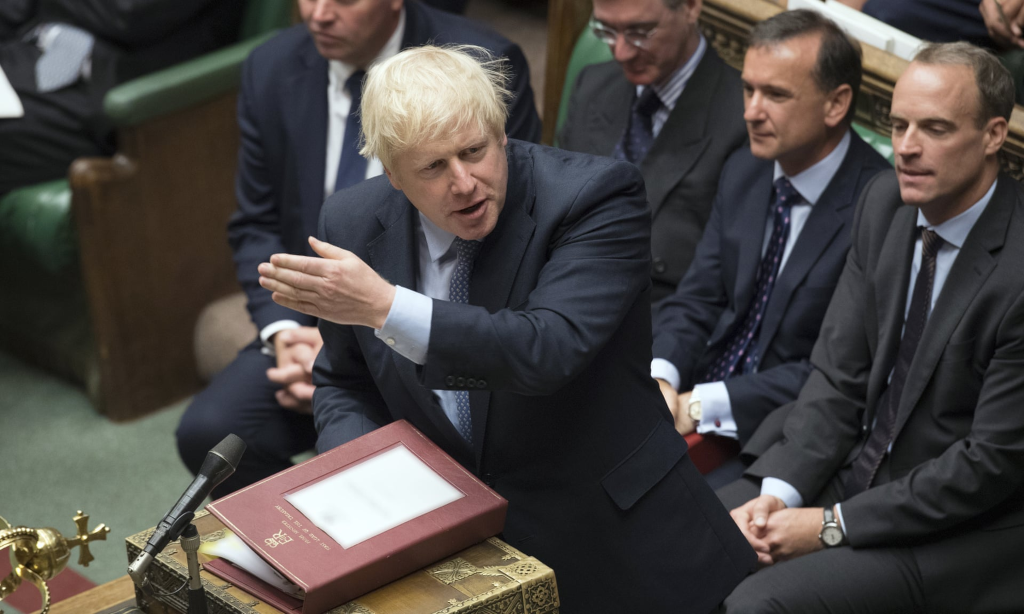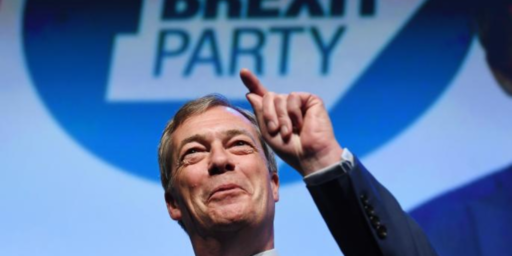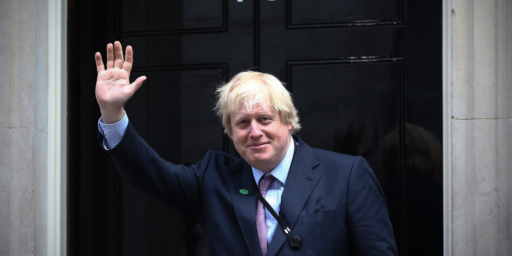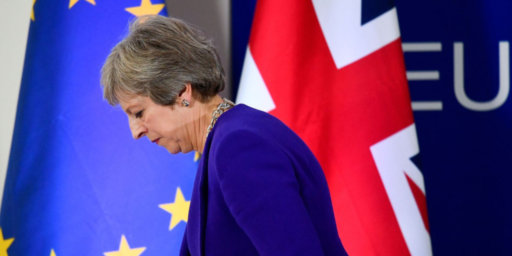Boris Johnson In Strong Shape As General Election Campaign Begins
With the 2019 United Kingdom General Election campaign just starting, Boris Johnson and the Tories look to be in strong shape. However, anything can happen in the next six weeks.

Forty days from today, British voters head to the polls for the third General Election in four years, and the fourth if you count the Brexit Referendum in 2016. In each of those elections, the issue of the United Kingdom’s leaving the European Union will be at the center of the race, but it has been different in each case.
In the 2015 election that solidified the Tory majority that had been won in 2010, Conservatives won in no small part on the fact that they were promising to put the issue of leaving the E.U. on the ballot during their next term of office. While the relationship between the United Kingdom and the European Union had always been somewhat rocky, it’s fair to say that it was at this point that the issue took center stage, especially since it obligated Cameron to follow through on his promise of a Brexit referendum.
That happened in 2016 with the Brexit Referendum itself in which Leave won a narrow victory over Remain in a victory that caused former Prime Minister David Cameron, who had supported the Remain side, to step down as party leader. Cameron, of course, was replaced by Theresa May, who was charged with guiding the nation through the Brexit process and negotiating a Brexit deal with the European Union.
In 2017, eyeing an opportunity to increase her bargaining power with the E.U. based on poll numbers that showed favorable numbers for the Tories, May called a snap election that ended up backfiring on her and required her to into a relationship with Northern Ireland’s Democratic Unionist Party to keep her hold on power. Fort the next two-and-a-half years, May attempt to negotiate a Brexit deal that Parliament would accept only to be stabbed in the back (and in the front) by her own political party. Unable to negotiate a successful deal, May stood aside and was replaced over the summer by Boris Johnson.
Anyone who has been following British politics and Brexit over the past three months is aware of what has happened since Johnson took over at Downing Street. We’ve seen rejections of Johnson’s own proposed Brexit plan, a suspension of Parliament that was obviously designed by Johnson to force a hard Brexit, a historic legal ruling nullifying that extension, and further moves by Parliament to limit Johnson’s authority vis a vis Brexit, an extension of the Brexit deadline yet again, and the calling of an election for December 12th.
Now, with the United Kingdom on the verge of a new election during which Brexit will be the primary, if not the only, issue, Johnson finds himself in a very good position in the polls:
U.K. Prime Minister Boris Johnson’s Conservatives have 36% support, ahead of Labour’s 28%, the Sunday Telegraph reported, citing the results of a survey by ORB International.
That was followed by the anti-Brexit Liberal Democrats, with 14%, and Nigel Farage’s Brexit Party, with 12%.
The results indicate a narrowing advantage for the Conservatives before the Dec. 12 election, the Telegraph said, citing four polls in the previous two weeks in which the Tories’ lead was 13 to 16 percentage points.
ORB conducted the survey of 1,510 voters Wednesday and Thursday. The Sunday Telegraph didn’t indicate the margin of error.
In addition to this poll, a number of other polls show the Tories with a strong lead over their competitors:
There have been four whole polls released in a single day, and yet somehow we’ve learnt next to nothing about the election. Let’s go through what they say.
Ipsos MORI released a poll with the Evening Standard, which gave the Conservative a massive 17 point lead.
Last night two other polls were released, one from YouGov, which put the Conservative lead at 15 points, and one from Survation, which put the lead at 8 points. A further YouGov poll was released, with fieldwork done over the course of 10 days rather than 2 or 3, and with 11,000 respondents, ten times the usual amount.
The odd thing about this is that, essentially, these polls don’t really show us anything. Compared to the start of September, nothing has changed. Of the four most frequent pollsters, ComRes was on 4 then, and it’s on 4 now. Survation was on 7 then, and it’s on 8 now.
YouGov was on 14 by the 6th of September, and it’s on 15 now – except for the larger poll, which is also on 14. Up until now, only Opinium has shown a major change, rising from from a 2 point Conservative lead, to a 14 point Conservative lead.
That means that as the new polls come out, all they tell us is that most of the pollsters are seeing a stable trend, but each is seeing a trend at a different scale. Of the four polls that have come out in the last 24 hours, YouGov and Survation have a more or less consistent narrative. Survation thinks there’s a moderate Conservative lead, and YouGov thinks there’s a big Conservative lead, including with it’s larger poll – though that doesn’t tell us as much as you might think, given how similar the results are.
At the same time, the “poll of polls” being followed by Politico Europe shows the Tories in the lead at 38%, followed by Labour at 26%, the anti-Brexit Liberal Democrats at 16%,, the pro-Brexit Brexit Party at 10%, and a handful of smaller or regional parties, such as the Scottish National Party at 3% or less. As is the case with the Generic Congressional Ballot here in the United States, it’s not easy to predict what this would mean for a final seat count in the House of Commons. It suggests, however, that if the election were held today, the Tories would be expected to get a sufficient majority to govern on their own without the need of a coalition partner like they’ve needed since the 2017 election. Of course, we saw similar numbers a month before that election as well and, instead of strengthening Theresa May’s majority it ended up requiring her to enter into a Supply And Confidence Agreement with Northern Ireland’s Democratic Unionist Party.
That’s why, as The New York Times notes nobody really knows what will happen over the course of the next six weeks or so:
It was shaping up as an ordinary day of campaigning in Britain’s extraordinary general election.
Prime Minister Boris Johnson visited a primary school in Suffolk where he showed children old pictures of London and told them about the days when rulers “used to stick the decapitated heads of the enemies on spikes.” His opponent, Jeremy Corbyn, promised a crowd in London that the Labour Party would never sell out Britain’s National Health Service to greedy American companies.
Then, shortly after 6 p.m. on Thursday evening, Nigel Farage, the insurgent leader of the Brexit Party, welcomed a special guest to his national radio show: President Trump, calling in from Washington to disparage Mr. Corbyn and urge Mr. Johnson to forge a hard-line pro-Brexit alliance with Mr. Farage.
In less than 30 minutes of drive-time banter, Mr. Trump had utterly scrambled the narrative, dominating the next day’s headlines, giving Mr. Farage and his fringe party much-needed oxygen and reminding analysts that nothing in this six-week campaign is likely to go as the soothsayers predict.
“Looking at the polling as it is today, the Conservatives are going to win, and win big,” said Tony Travers, a professor of politics at the London School of Economics. “But the polls looked like this in 2017, and it all evaporated for the Conservatives by the time people voted.”
In that election, Mr. Johnson’s predecessor, Theresa May, set herself the goal of expanding her parliamentary majority. But she proved to be a poor campaigner, and by the time it was over, she was left with a minority government that hobbled her in Brexit negotiations with the European Union and ultimately doomed her withdrawal plan.
Mr. Johnson is viewed as a better campaigner than Mrs. May. He plans to run on a simple message: Get Brexit done quickly, under the agreement he negotiated with the European Union, so that Britain can embark on a shiny future of profitable trade deals with the United States and other countries.
Yet he, too, is a hostage to fortune, facing the danger that the narrative may shift unpredictably and in ways that hurt the Conservative Party.
The number of potential outcomes here is quite varied, of course. Britain could end up with the majority Tory government that the polls seem to be indicating now. This would likely mean early ratification of Johnson’s Brexit deal and a Brexit earlier than the current deadline of January 31st. On the other extreme, there’s the possibility of Labour somehow managing to pull of a win, which would leave the fate of Brexit unclear since the party is not united on the Brexit question at all. It’s also possible that we could see one of the two minor parties — the Lib Dems and the Brexit Party — will see their power in Parliament increase to the point where they could prove to be the deciding factor in which major party ends up controlling the House of Commons. The final possibility, of course, is that the result could end up close to 2017’s hung Parliament, leaving the House of Commons and the status of Brexit as unclear as it was before the election was called.
It’s going to be an interesting six weeks.





Now it looks like Nigel Farage has decided to not stand for any seat whatsoever. Oh, he’s running his mouth off about how this is so he can run around England and “help support” the 600 Brexit candidates The Brexit Party (TM) will be floating….but aside from the real diehards everyone is interpreting this as Farage realising he doesn’t have enough support to get elected…anywhere.
Dr. North over at EUReferendum is referring to Nigel’s playtoy as “BrexitCorp” rather than “The Brexit Party”. I think he’s quite right. Considering how Farage has acted in the past I suspect he’ll throw a hissy fit when nobody gets elected, whine about how everyone is against him, and jump away with all of the money in the coffers. If he thinks there are enough idiots out there expect Brexit Party 3.0, probably under a name like “The True Brexit Party”.
Curious, polls have shown that if Brexit was on the ballot today, it would fail, but the party advocating Brexit is the leading contender to form a new government. Understand there are other issues beside Brexit, but it appears from this bunker that Brexit is an existential issue being faced by the UK.
@Sleeping Dog: The thing, the election is not just about Brexit (nor was the prior one). These are elections for parliament, and government, for (potentially) five years.
It doesn’t help, either, that Labour has a confused message on Brexit and that their leader is incredibly unpopular.
Plus, like I often note about the US, single seat plurality districts do a lousy job of representing national sentiment in an accurate fashion.
@Sleeping Dog:
A lot of people, even including those who voted Remain, still don’t understand how bad economically any “hard” Brexit will be,
That is, No Deal would be horrendous, but May’s or Johnson’s deals would also be very damaging, unless they can be radically modified in the post-exit trade talks.
And the “bored with Brexit” effect combines with this to make people actively try to look aside.
Also, Jeremy Corbyn is spectacularly, epically unpopular.
He has an approval rating around minus 60; no other leader or government or opposition has scored this badly in the past 50 years; I’ve been unable to find polling data before then but I suspect he holds the all-time record.
IIRC even c. 40% of Labour supporters polled dissatisfied.
His tendency to ambivalence on Brexit is one factor; his left wing policies another; but the overwhelming factor IMHO is his record of animosity to “the West”, and related tolerance of anti-Semites and violent radicalism.
If Corbyn stood aside, almost any other Labour leader would walk it to victory.
However, he continues to have the support of the Labour left and much of the activist base, and is dug in like a tick.
The only thing that makes a lot of people willing to consider Corbyn as PM is that he would be temporary, but hard Brexit’s damage would be permanent; and he would be constrained by his own MPs and by the near certain need for SNP and/or Liberal Democrat support.
A lot of reporters are looking too much at the national polls at this point, IMO.
If you look at the different type of seats (northern Leave Lab/Con competitions, southern Remain Con/LibDem competitions, big city urban Remain, suburban Conservative Remain, rural Conservative Leave etc) plus the SNP impact, the Conservative road to a majority seems bumpy.
They MUST make unprecedented inroads into Labour seats in the North and Midlands; but it looks like a lot of the movable votes already shifted to Conservative or UKIP in the last election.
If Cons. picked up all the UKIP votes, they could get a small majority, but they harder they campaign for those the more they alienate “centrist/Remain” votes elsewhere.
And unless the Labour vote collapses completely enough to end the “tribal” adherence of the old industrial working class, the Conservatives could easily lose more net than they gain that way.
Another hung Parliament looks most probable outcome.
As for Farage, the cynic in me inclines to think he’s just trying to raise his price for a Conservative buy-out.
Thing is, the Brexit Party IS organised as a company under Farage’s control, not a traditional Party; Farage can sell them out without his followers being able to do a damn thing about it.
But if so, he really needs to do so before 14 November, when the candidate registration is finalised.
@Steven L. Taylor:
@JohnSF:
Thanks for the added info. While I have an understanding of how the UK system works, it is really at a space shuttle level.
Nigel’s beating the drum about having “someone standing for The Brexit Party in all races!”
The fact that The Brexit Party has been recently polling in the single digits is, of course, left out. Nigel’s supporters are rattling the castanets, claiming loudly that polls don’t measure anything, and that as more people are informed of the horridness of Boris’s WA, there will be a stampede towards The Brexit Party. Supposedly there’s a great hidden population that will come out of the woodwork on the day of the election which will vent its wrath on the present Parliament.
(The assumption that every single “Leave” voter from the 2016 referendum is a die-hard Brexit Party supporter is…interesting.)
Given that Britain is still FPTP, I suspect that the number of seats that the Brexit Party will in fact pick up is…zero to one.
Little hard to stampede a “no deal” through Parliament on the backs of that. I’m sure Nigel will be raising money on the promise of sweet, sweet, no deal Brexity success, however.
@grumpy realist:
BrxP highly unlikely to win any seats.
But, there’s a tricky bit of electoral calculus here, due to FPTP and the political demographics of constituencies.
Farageists split the Leaver vote (main effect IMHO) hence possible attraction of a Brexit Party/Tory pact which worries some Remainers a lot and some prominent Leaver Conservatives (e.g. Lord Ashcroft) were urging.
On the other hand, it was very noticeable with UKIP, and polling for BrxP looks similar, that former Labour voters would switch to them but not to Conservatives.
In a lot of the old industrial areas “never vote Tory” working class family traditions are very strong.
So a Labour fear is BrxP might erode Labour vote among Leavers, Lib Dems among Remainers, and let Conservatives edge ahead.
I think the damage is more likely to impact Conservative margins than Labour, but it’s a judgement call, and really needs the sort of seat-by-seat polling data analysis that’s not publicly available.
Another factor in play is that there is a lot of reciprocal detestation between Team Farage and the Johnson/Gove/Cummings/Elliot axis.
I think Farage was aiming for a deal, but set his price too high.
Others might argue he was just being the drama queen again.
Interesting that Farage has decided not to stand himself though.